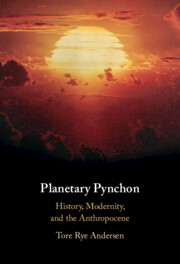Book contents
Chapter 7 - Conclusion
Too Late?
Published online by Cambridge University Press: 24 August 2023
Summary
Planetary Pynchon: History, Modernity, and the Anthropocene has three interrelated agendas: (1) It establishes Thomas Pynchon’s three longest novels – Gravity’s Rainbow, Mason & Dixon, and Against the Day – as an ambitious, world-historical trilogy about the emergence and global spread of European modernity and thus presents a groundbreaking new understanding of one of the most important contemporary novelists. (2) On the basis of the analysis of the trilogy’s profound engagement with global history, it presents an elaborate discussion of Pynchon’s historical methods, which refines our understanding of Pynchon as an author of historical fiction and challenges prevalent notions of his relation to literary postmodernism. (3) It charts Pynchon’s early anticipation of anthropocenic and planetary ideas, including their close connection to modernity’s and globalization’s demand for constant growth. In so doing, it constitutes an important corrective to other recent studies of literature and the Anthropocene, showing how literary fiction is not merely a belated reflection of scientific debates about the Anthropocene, but has taken an early and active part in establishing the contours of the current discussions.
Keywords
- Type
- Chapter
- Information
- Planetary PynchonHistory, Modernity, and the Anthropocene, pp. 192 - 194Publisher: Cambridge University PressPrint publication year: 2023



